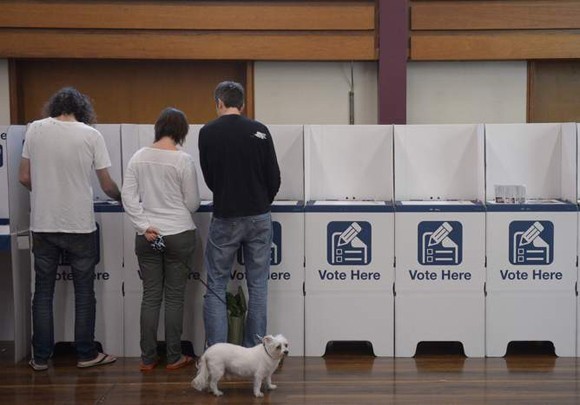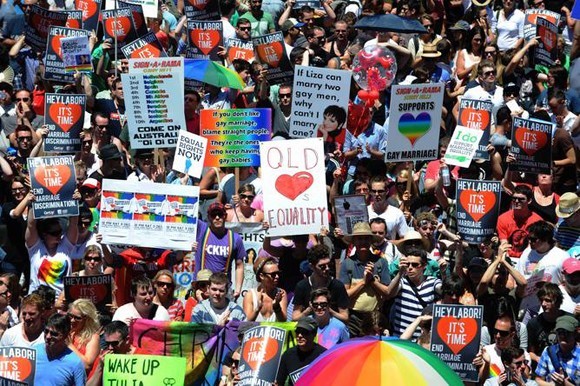Recent polling suggests a majority of Australians support same-sex marriage, but should the issue be taken to the people in a referendum? AAP/Dean Lewins
Despite several Galaxy polls indicating that a majority of Australians support same-sex marriage – and it receiving the support of former prime minister Kevin Rudd – recent proposals for a referendum on the issue at the next election have not been greeted with much enthusiasm by members of the gay and lesbian community.
However, figures as diverse in outlook as Tony Windsor, Fred Nile and Gerard Henderson have all welcomed the idea.
Is it only a coincidence that those receptive to a referendum have been opposed to marriage equality, or noncommittal at any rate?
Actually, the pattern might have been predicted, and is not unique to Australia. Conservative Party figures in Britain demanded a referendum on the issue after prime minister David Cameron threw in his lot with marriage equality in 2012.
Let’s be clear about what a referendum in Australia is meant to resolve. Party discipline has so far been foisted upon an issue which many would consider to be a matter of conscience.
If a conscience vote were allowed across all parties, a bill amending the Marriage Act would very likely pass both houses of parliament. In the absence of a conscience vote – and confronting what looks to be an impasse in the national parliament – a referendum is meant to side-step the process altogether by submitting the issue directly to the people.
Why then might those who stand most to benefit from a referendum be opposed to one? And, conversely, why would those who stand to lose their present advantage be in favour of one?
Prominent gay rights advocates have raised concerns about the effects a negatively charged “no” campaign could have on the mental health and wellbeing of young gay and lesbian people, particularly those still coming to terms with their sexuality.
It is feared that old prejudices will resurface that have long been outdated, with divisions, animosities and misinformation rife. It is also argued that direct democracy is typically reserved for constitutional amendments, and should not be necessary when the simplest of amendments to an existing act of parliament would suffice.
These mental health concerns are not misplaced, and should be taken seriously: so too should the anxieties surrounding extremist partisans stoking irrational fears and hatreds.
But there’s a deeper reason why a referendum should not be the method of choice for resolving important social questions of this nature. The answer here goes some way to explaining why the pattern of those for and against a referendum falls the way it does.
For those who see this issue as concerning basic human rights and citizen equality, a successful referendum cannot confer any more legitimacy upon the right than it has already. All kinds of matters might be put to a court of public opinion, but the rights of minorities to fair and equal treatment before the law and access to the same civic institutions as everybody else are simply not matters fit for public approval.
For example, if the public declined to return a vote in favour of some basic human right for a certain minority, the result could not be recognised as decisive of that minority’s rights. While this might sound anti-democratic, it is nothing of the sort.

Referendums are usually reserved for constitutional amendments. AAP/Dean Lewins
All genuine liberal-democracies are premised on self-determination, maximally compatible freedoms, equal say, mutual tolerance and inclusion. All genuine liberal-democracies are attempts to form a kind of social compact, what the philosopher John Gray has called a modus vivendi between different ways of life.
No bloc majority of citizens can remove or withhold the basic rights enjoyed by all those included in the citizenry, since these rights are, as the legal philosopher Jeremy Waldron has explained, the preconditions of a social compact being formed that melds so many different ways of life together.
All of this explains why opponents of same-sex marriage would only be too willing to submit the issue to a popular vote. Many might not be opposed to civil unions, or in any conscious way seek to delegitimise gay and lesbian relationships.
But the question of same-sex marriage is not, for its opponents, a question concerning basic human rights and equality. To them, same-sex marriage lies outside the class of rights and freedoms that are non-negotiable, and unsurprisingly, therefore, is an issue suited to resolution by popular vote.
In the end, the stance against a referendum can only be maintained consistently – and without insult to democracy – if the issue of same-sex marriage is viewed as one in which basic civil rights and freedoms are at stake.
A referendum is not the best way to proceed in a matter where majorities cannot have the final say. Of course, this is not to concede that elected majorities, like parliaments, should have the final say.
It merely appreciates that parliamentary deliberative processes, on the whole, are likely to be less divisive and inflammatory than alternative methods of collective decision-making.
Author:John Zerilli
Publication: The conversation
Publication Date: May 22 2013

